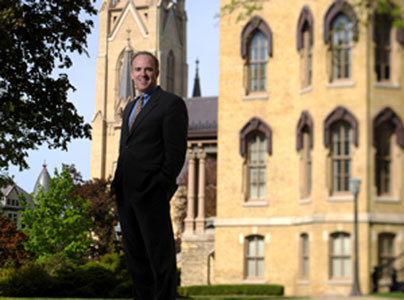International Relations and Religion

Co-conveners: Michael Desch (left)
and Daniel Philpott (right)
Members:
William Cavanaugh, DePaul University; Michael Desch, University of Notre Dame (Co-convener); Kirstin Hasler, University of Notre Dame (Graduate Student); Ron Hassner, University of California, Berkeley; Amaney Jamal, Princeton University; Atalia Omer, University of Notre Dame; Daniel Phlipott, University of Notre Dame (Co-convener); Sebastian Rosato, University of Notre Dame; Timothy Shah, Georgetown University; Nilay Siaya, University of Notre Dame (Graduate Student); Jack L. Snyder, Columbia University; Monica D. Toft, Harvard University; Ernesto Verdeja, University of Notre Dame
Three Questions Explored

1) How should we study religion and international relations? (August 17-18, 2011, South Bend)
A) What do we mean by "religion" in international relations: is it primarily an identity or a theology?
B) When and under what conditions does religion matter in international relations and how much?
C) What are the strengths and weaknesses of different ontological and epistemological approaches to the study of religion and international relations?
D) What does it mean to say religion and politics are "separable" in international relations?
2) How can religion broaden our understanding of international relations? (Spring 2012, Chicago)
A) What is the connection between religion and nationalism?
B) How does the diversity within religious traditions (particularly in Christianity, Islam, Hinduism, and Confucianism) affect their manifestations in international relations?
C) What are the theoretical and empirical "anomalies" or "puzzles" that a secular approach to international relations confronts and the integration of religion might resolve?
3) What should be the core of the future research agenda for religion and international relations? (Summer 2012, Chicago)
A) How can we profitably broaden the discussion of religion and intra- and inter-state conflict beyond the current focus on non-state actors animated by radical Islam?
B) As a result of the most recent wave of scholarship, there is likely to be a grudging consensus that religion remains a factor in the behavior of international actors. Is there any chance that a similar consensus might emerge on the role of religion as a source of universally compelling normative prescriptions?
C) What should be the agenda for the future study of religion and world politics? [Outline of final White Paper on "Hypotheses on the Study of Religion and International Relations"]
Please click here to read the International Relations and Religion working group's final report.

